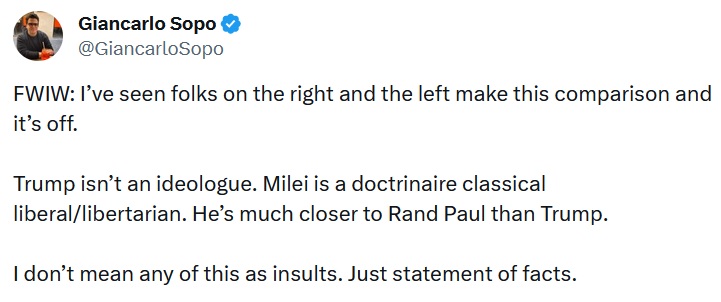There was a political earthquake in Argentina when a hard-core libertarian got the most votes in the August nationwide presidential primary.
Now everyone is paying close attention to Sunday’s general election. Will voters choose Javier Milei in hopes of rescuing their moribund economy?
Before taking a close look at the candidate, let’s be clear that Argentina’s economy needs to be rescued. Decade after decade of statist policy has turned a formerly rich nation into an economic basket case.
- Too much spending.
- Too much protectionism.
- Too much redistribution.
- Too much regulation.
- Too much money printing.
Argentina’s economic misery is not a surprise to anyone who has paid attention.
But it is a surprise that voters now seem to understand that government is the problem.
So is Javier Milei the solution?
The establishment media seems to think he’s another Donald Trump. Indeed, the New York Times used this headline in a story yesterday.

But, as is often the case, the New York Times is off base.
In a column for the Foundation for Economic Education, Federico Fernandez explains that it is absurd to equate Milei and Trump.
Javier Milei is not a mere populist figure seeking attention with polarizing speeches. He is, in essence, a radical reformist eager to sever the bonds with the cycle of decline that has plagued Argentina since Peronism ascended to power in 1946. …Milei advocates for a total transformation. He envisions an Argentine economy anchored in the principles of free markets, private property, Western values, and the nation’s classical liberal Constitution… Rather than peddling baseless conspiracy theories or pointing fingers at marginalized groups, Milei gives voice to a sentiment growing, particularly among the country’s youth: Argentina’s statist, highly taxed and uber regulated economy has collapsed and it is irredeemable. …Argentina might be on the brink of an epochal shift, and the compass is not directed at Trump’s America but towards the revolutionary paths carved by Balcerowicz and Laar. Seeing nothing redeemable in Argentina’s populist edifice, he contends it should be torn down, reminiscent of the disintegration of communism in the wake of the Berlin wall’s fall.
Likewise, it is wrong to think of Milei as an Argentine version of Brazil’s Jair Bolsonaro.
Here are some excerpts from Daniel Raisbeck’s column in Reason.
…you may be under the impression that Javier Milei…is an identikit of Jair Bolsonaro, Brazil’s former president, whom several news outlets dubbed “the Trump of the Tropics.” …Like Bolsonaro and Trump, Milei breaks with established political protocol—through the tactical use of profanity—and totally disregards political correctness. Beyond the gimmicks and blanket statements, however, Milei’s differences with both Trump and Bolsonaro are as significant as the similarities. …Bolsonaro is a career army officer who served in Congress for 27 years, during which he often voted against free market measures… Months before the 2022 election, he unveiled a $7.6 billion package of “social spending” that…amended the constitution “to bypass the country’s spending cap and boost social benefits.” …Milei is different. …a trained economist with a solid understanding of Austrian School principles. He is the intellectual product of Argentina’s rich tradition of classical liberal thought. …Milei’s main proposals include a unilateral commercial opening for highly protectionist Argentina, getting rid of the central bank, and mothballing the national currency by dollarizing the economy—a far cry from Trump’s economic nationalism.
Spot on. Trump probably wouldn’t even know how to spell dollarization, much less understand why it is a good idea.
This tweet accurately points out that Milei is like Rand Paul rather than Trump.

There is, however, one similarity between Milei and Trump. Both are blunt and willing to be aggressive
But even in that case, there’s a difference. Trump goes after people for personal reasons while Milei goes after people for philosophical reasons.
Consider, for instance, his criticism of Pope Francis, as reported by the U.K.-based Guardian.
In one corner of the ring stands Javier Milei, 52, self-described former tantric sex coach, outsider anarcho-capitalist and frontrunner in Argentina’s upcoming presidential elections; in the other, his compatriot Pope Francis… Milei, a political unknown until 2020, has pledged to wage a “cultural battle” to transform Argentina into a libertarian paradise where capitalist efficiency replaces social assistance… From Rome, Pope Francis has expressed grave concern about the rise of such callous policies in his home country. …The pope’s doctrine of social justice is synonymous to theft in Milei’s Liberty Advances party because it relies on tax revenues. “Jesus didn’t pay taxes,” Milei once tweeted, tagging the Pope’s official account. …Milei has trolled Francis with repetitive toxic tweets calling him a “communist turd”, a “piece of shit” and accusing the pontiff of “preaching communism to the world”. …Humanist is not a term that could be applied to Milei’s economics. Apart from legalising the sale of body organs, his spiky agenda proposes “dynamiting” the Central Bank, abolishing Argentina’s tuition-free public education system and disbanding free public health services.
Since I’ve also criticized Pope Francis (albeit not with such colorful language) for statist policies, I obviously agree with Milei. And I’m amused by Milei’s invocation of a libertarian-leaning Jesus (who can be seen here, here, here, and here).
I’ll close with a confession that I have no idea if Milei would be an economic savior for Argentina. I like his ideas, of course, but I have no idea if he could implement them if elected.
Heck, maybe the conventional center-right candidate (Patricia Bullrich) is the Argentinian version of Ronald Reagan and would be a more effective force for smaller government. Or maybe the leftist candidate (Sergio Massi) intends to copy New Zealand, where the nominally left-wing Labour Party in the 1980s adopted free-market reforms that rejuvenated that nation’s economy.
That being said, given the dismal performance of the last center-right president and horrid track record of the Peronist leftists, expecting good results from either may be a triumph of hope over experience.




